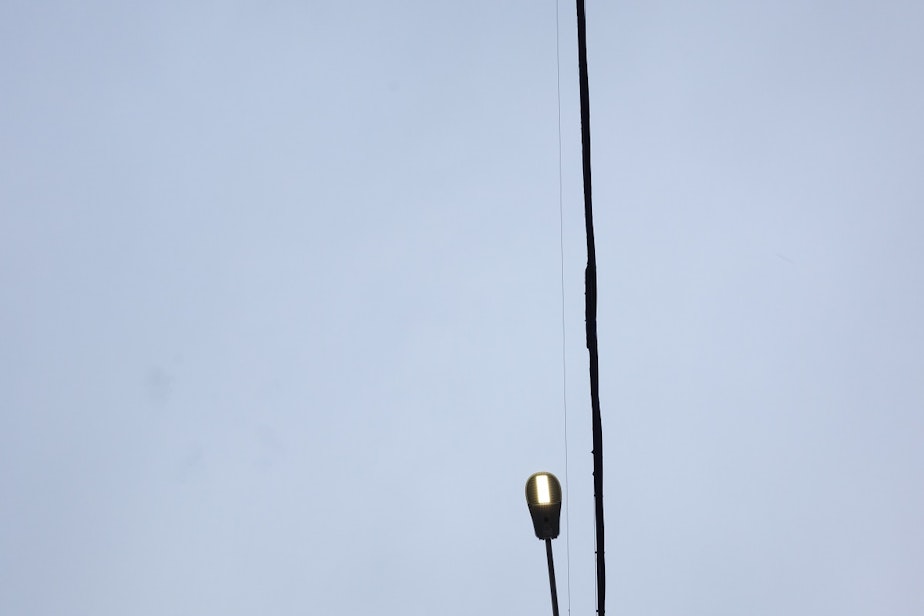Seattle street lights may disrupt your sleep — but don't expect new ones for a while

Seattle street lights are, it appears, bad for spiders.
And you and me and other wildlife — the intense white-blue light can disrupt the circadian rhythms of anyone beneath its glare.
These particular LED lights disrupt melatonin, the sleep hormone, which makes for bad sleep. Poor sleep leads to obesity, cancers and … death.
So.
Starting this week or next, Seattle begins the slow task of replacing these old lights. The city says that will happen as the current ones burn out. Because LED lights are so long-lasting, the process will take longer than a decade. The pilot project for the new ones begins in Magnolia, near the corner of Constance Drive and Parkmont, where residents have been particularly vocal.
“Blue lights fuck up your circadian rhythms,” said Kurt Owen, a Magnolia resident who opposes the bright white LEDs. Owen was among those who read a 2016 statement by the American Medical Association about the impact of high-intensity LED street lights on human health and wildlife.
Dr. Mario Motta, an American Medical Association board member, said the ultra-white LED bulbs used in Seattle emit too much blue light, which can cause serious health problems. Any light can be bad, Motta said, but blue light is worse, and the current LEDs used in Seattle streetlights have too much of it.
Those bright bulbs, the ones we’re replacing now, had been Seattle’s great hope when they were unveiled in the mid-2000s, when Greg Nickels was mayor. Forty percent more efficient than the high-pressure sodium bulbs they replaced, they were going to help save the planet.
They were great — at first — and the city boasts that they saved millions in energy costs and improved visibility and public safety. The city has installed tens of thousands of these new bulbs over the last decade.
But they were controversial from the start. When they were introduced, the city compared the bulb light to moonlight. Some residents agreed. Others complained about ultra-bright white light flooding into their homes at night.
Then came the American Medical Association statement that supported these neighbors’ claims. Other studies, too, concluded that high-intensity LED street lights are bad for wildlife, from birds to spiders.
There are naysayers, of course. The Lighting Research Center at Rensselaer Polytechnic Institute doesn’t concur with the medical association, saying that the blue light is “probably not a concern” for most people. The Lighting Research Center, which has partnerships with lighting industry giants, including Philips, was not available for comment in time for this story.
Scott Thomsen with Seattle City Light said he is also skeptical of the medical association’s conclusions.
He said the utility doesn’t deny that blue light is bad for sleep. But Thomsen said the amount of light beamed into a home at night pales in comparison to light from TVs and cell phones, which he said are likely a much bigger source of blue light.
Thomsen also said that the American Medical Association’s recommendations played no direct role in the decision to unscrew the city’s lightbulbs. That said, the bulb change Seattle is making is exactly what the American Medical Association recommends.
The current LEDs Seattle uses are rated over 4000 on the Kelvin light temperature scale. And the newer bulbs will just barely meet that AMA recommendation of 3000 Kelvin or lower.
The new warmer white LED lights will roll out very slowly, as current bulbs burn out. Because LEDs are so long-lasting the process will take over a decade. The city does not currently plan to make any bulb changes along arterial routes or in commercial district.
Thomsen said the new LED pilot will also study the use of newly designed light posts, which will double as hosts for small cell antennas in some parts of the city.

